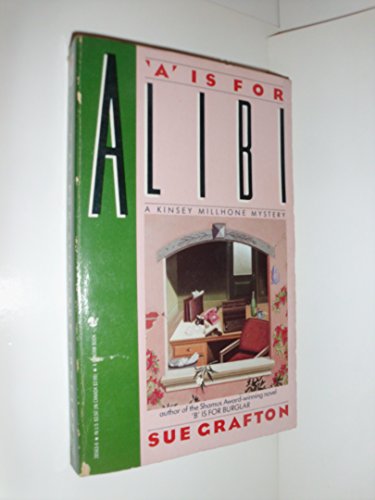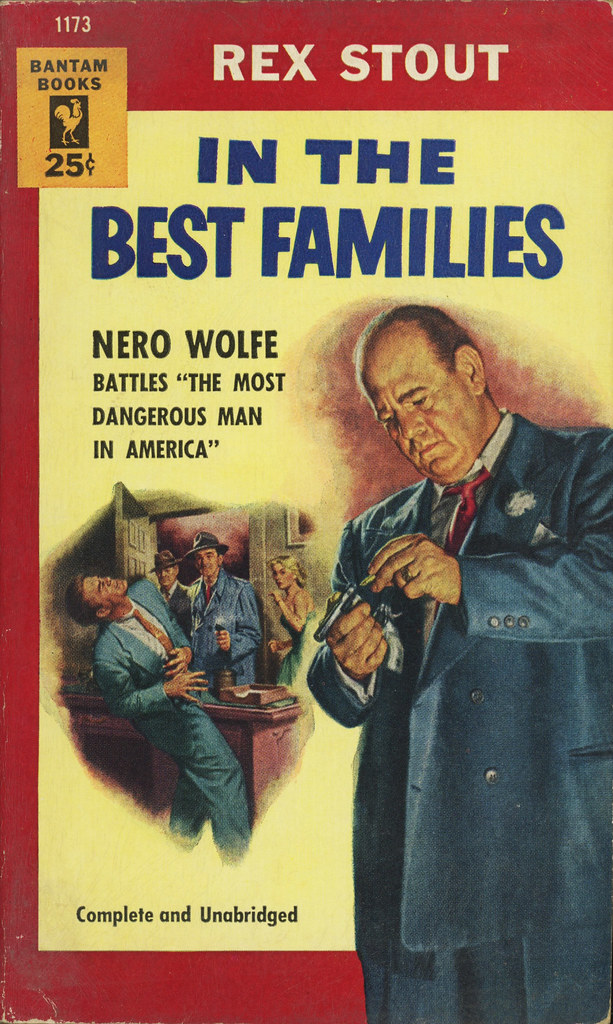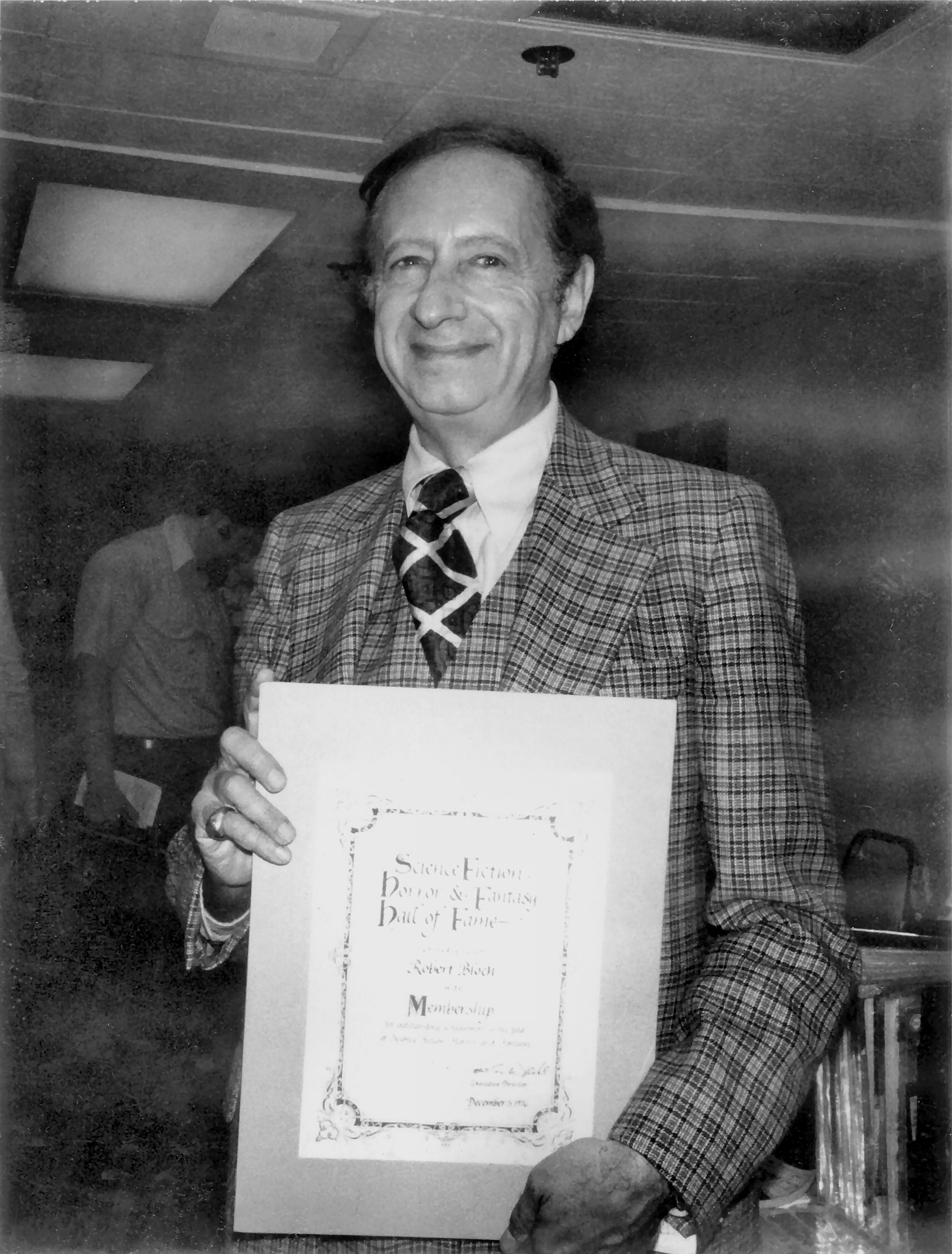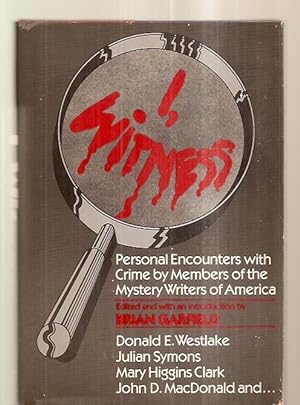April 30, 1982. This date saw the publication of A is for Alibi, by Sue GraftonIn it she invented Kinsey Milhone, was one of the first female private eyes to make
an impression.
One of the unique things about the series is that they have stayed in
the 1980s, progressing a few months in each book. By the time Z is for Zero arrives Kinsey may have a cell phone. It is rare for a series to turn into historical fiction.
MWA named her a Grand Master in 2009. I won't list all the other
awards. I will say Grafton is one of my favorite writers of P.I. short
stories.
Sunday, April 30, 2017
Saturday, April 29, 2017
4/29/ 1999. Mr. Clark and Mr White score an Edgar
April 29, 1999. On this date the Mystery Writers of America gave
out the Edgar Awards. The prize for best novel of the year went to
Robert Clark for Mr. White's Confession. It's Saint Paul in
1939. Some women are murdered and the prime suspect is a modest little
man, who seems as decent as can be. But his memory is so bad he doesn't
know whether he did the deeds or not...
Kirkus Reviews called it "the most tender account of a sex-killing investigation you’ll ever read.”
Kirkus Reviews called it "the most tender account of a sex-killing investigation you’ll ever read.”
Friday, April 28, 2017
4/28/199? Soft MOney starts
April 28, 199?. On this date in some year in the 1990s the plot begins in Soft Money, a novel by K.J.A. Wishnia. Former New York cop Filomena Buscarsela agrees to look into the murder of a local grocery store owner. Publisher's Weekly called it "a spirited sequel," to Buscarela's first appearance in 23 Shades of Black, which was nominated for an Edgar and and Anthony.
Thursday, April 27, 2017
4/27/1994 Grand Masterhood for Lawrence Block
April 27, 1994. The Edgars Banquet was held on this day and the Mystery Writers of America granted Grand Master status to Lawrence Block for his contribututions to the private eye novel (with Matt Scudder), comic crime (Bernie Rhodenbarr), comic spy (Evan Tanner) and much more.
That autumn I was chairing a panel on short stories at Bouchercon in Seattle and, a month before, when I had settled everything with the panelists about what we would do and when, the bosses asked if we could squeeze in one more panelist who was interested in the panel. Fella named Larry Block.
Not being a complete idiot I said, I said, hell yes. He was terrific and the panel drew a huge crowd. And the highlight of my writing career is walking from the green room to the conference room with Edward D. Hoch leading the way and Lawrence Block marching behind me.
That autumn I was chairing a panel on short stories at Bouchercon in Seattle and, a month before, when I had settled everything with the panelists about what we would do and when, the bosses asked if we could squeeze in one more panelist who was interested in the panel. Fella named Larry Block.
Not being a complete idiot I said, I said, hell yes. He was terrific and the panel drew a huge crowd. And the highlight of my writing career is walking from the green room to the conference room with Edward D. Hoch leading the way and Lawrence Block marching behind me.
Wednesday, April 26, 2017
4/26/1975 McCloud rides onto the cover of TV Guide
April 26, 1975. McCloud ran for seven years but only produced 45 episodes. Sounds almost BBC, doesn't it? No, it was very American, but part of NBC's Mystery Movie series, along with Columbo and some lesser lights. Dennis Weaver starred as a Taos, New Mexico lawman shipped east to teach them New Yorkers a thing or two. The ever popular fish out of water, rube- outsmarts-city-slicker theme.
This is his third appearance on the cover of TV Guide, and this time he brought along a couple of castmates.
This is his third appearance on the cover of TV Guide, and this time he brought along a couple of castmates.
Tuesday, April 25, 2017
4/25/1996 Come to Grief comes to Edgar
May 25, 1996. On this date the Mystery Writers of America gave the Edgar Award for Best Novel of the year to Come to Grief. It was Dick Francis' third win and he remains the only person to score a hat trick in that category. While Francis didn't write many novels about the same character, this was the third book about Sid Halley, a former jockey who turned private eye after losing an arm in a racing injury. (The second book in the series, Whip Hand, was also an Edgar winner).
Monday, April 24, 2017
4/24/1936 MacKinlay Kantor turns to crime
April 24, 1936. MacKinlay Kantor is best remembered as the author of the Civil War play Andersonville, which won the Pulitzer Prize in 1956. His novel Glory For Me was the basis for the excellent movie The Best Years of Their Lives.
But back in 1936 he published a crime story in Colliers Magazine. "Rogues Gallery" is his most reprinted story, including an appearance in Ellery Queen's Mystery Magazine.
But back in 1936 he published a crime story in Colliers Magazine. "Rogues Gallery" is his most reprinted story, including an appearance in Ellery Queen's Mystery Magazine.
Sunday, April 23, 2017
4/23/2001 Nero Wolfe comes to A&E.
April 23, 2001. There have been several attempts to bring Rex Stout's brilliant if somewhat pudgy detective to the big or small screen in the U.S. Two unimpressive movies in the thirties. A TV pilot in the late fifties with William Shatner as sidekick Archie Goodwin. A pilot/TV movie in the seventies that was pretty good but didn't air because the star, Thayer David, passed away. In 1981 we had the William Conrad version which we will graciously ignore.
But on this day A&E introduced the best (and so far last) version. A Nero Wolfe Mystery was produced by Tim Hutton, a dedicated fan of the Corpus, who played Archie Goodwin (inexplicably, he gave the Ohio-born gumshoe a New York accent). Maury Chaykin was suitably grumpy as the fat man.
I used to reread Stout books as comfort food when I had a cold. Now I crank up a DVD of one of these.
But on this day A&E introduced the best (and so far last) version. A Nero Wolfe Mystery was produced by Tim Hutton, a dedicated fan of the Corpus, who played Archie Goodwin (inexplicably, he gave the Ohio-born gumshoe a New York accent). Maury Chaykin was suitably grumpy as the fat man.
I used to reread Stout books as comfort food when I had a cold. Now I crank up a DVD of one of these.
4/23/1923 Avram Davidson is born
April 23, 1923. Avram Davidson was born on this date in Yonkers, NY. Man led an interesting life. Navy medic during World War II. Talmudic scholar. Besides winning the Edgar Award he won several fantasy and science fiction awards.
I discovered him when his "The Lord of Central Park" appeared in Ellery Queen's Mystery Magazine under the title "A Manhattan Night's Entertainment." (Editor Frederic Dannay was a notorious title tinkerer.) This novella involved an innocent young lady from the midwest, a pickpocket, the Mafia, the Nafia, Hudson River pirates, a plot to blow up the Brooklyn Navy Yards, and a British earl who lives in a cave in Central Park with his pet falcon.
He crossed the fantasy-mystery line with his tales of Dr. Esterhazy, who lived in Scythia-Pannonia-Transbalkania.
He also ghost-wrote two late Ellery Queen novels.
I discovered him when his "The Lord of Central Park" appeared in Ellery Queen's Mystery Magazine under the title "A Manhattan Night's Entertainment." (Editor Frederic Dannay was a notorious title tinkerer.) This novella involved an innocent young lady from the midwest, a pickpocket, the Mafia, the Nafia, Hudson River pirates, a plot to blow up the Brooklyn Navy Yards, and a British earl who lives in a cave in Central Park with his pet falcon.
He crossed the fantasy-mystery line with his tales of Dr. Esterhazy, who lived in Scythia-Pannonia-Transbalkania.
He also ghost-wrote two late Ellery Queen novels.
Friday, April 21, 2017
4/21/2015 How a Gunman Says Goodbye
April 21, 2015. This date saw the American publication of the second volume in Malcolm Mackay's Glasgow Underworld Trilogy, three amazing books about organized crime in that Scottish city.
Frank MacLeod is an aging hitman who works for the top crime boss in that city. He's good at his job, but how long can he do it? His boss has youngsters nipping at his heels, and Frank has competition too. And this is one job where there is no pension plan...
Publisher's Weekly called it "gripping and surprisingly poignant."
Frank MacLeod is an aging hitman who works for the top crime boss in that city. He's good at his job, but how long can he do it? His boss has youngsters nipping at his heels, and Frank has competition too. And this is one job where there is no pension plan...
Publisher's Weekly called it "gripping and surprisingly poignant."
Thursday, April 20, 2017
4/20/1841 The mystery story is born
April 20, 1841. That was the publication date for the issue of Graham's Magazine which featured "The Murders in the Rue Morgue," in which Edgar Allan Poe invented the detective story.
Oh sure, you can find earlier stories with this or that element, but in one tale Poe included:
* A genius detective
* An admiring assistant (or "Watson") who narrates
* Bungling police officers
* Scientific crime scene investigation
* Least likely suspect
In three more stories (two about Auguste Dupin, the genius detective, plus "Thou Art The Man") he added:
* The obvious clue
* The roman a clef
* The gathering of the suspects
So happy birthday to the mystery field!
Oh sure, you can find earlier stories with this or that element, but in one tale Poe included:
* A genius detective
* An admiring assistant (or "Watson") who narrates
* Bungling police officers
* Scientific crime scene investigation
* Least likely suspect
In three more stories (two about Auguste Dupin, the genius detective, plus "Thou Art The Man") he added:
* The obvious clue
* The roman a clef
* The gathering of the suspects
So happy birthday to the mystery field!
Wednesday, April 19, 2017
4/19/1869 Melville Davisson Post arrives
April 19, 1869. Melville Davisson Post was born on this day in West Virginia. He is best remembered today as the author of short stories about Uncle Abner, a countryman with a love of the Bible and great skill at solving mysteries. He also invented Randolph Mason (Perry's grandpa?), a New York lawyer as slick and amoral as Abner was honest.
Tuesday, April 18, 2017
4/18/2008 Trouble in Bruges
April 18, 2008. In Bruges is released in the U.S. After
a deadly screw-up two British hit men find themselves banished to
Belgium by their temperamental boss. In the disaster that follows all
three of the main characters manage to cobble together a little shred of
redemption. Colin Farrell, Brendan Gleeson, and Ralph Fiennes starred
in a wonderful movie.
Monday, April 17, 2017
4/17/1919 The first Edgar winner is born
While serving in the army he also managed to edit a famous fantasy collection called Out of This World, compiled from sources he found in army base libraries.
Sunday, April 16, 2017
4/16/1991 Night of the Ice Storm
April 16, 1991. This date saw the publication of David Stout's second novel, following the Edgar-winning Carolina Skeletions. Like his first book, Night of the Ice Storm involves the investigation of a murder that happened decades before. Reviewer Marilyn Stasio in the New York Times called it "coolly terrifying" and "killingly suspenseful."
Saturday, April 15, 2017
4/15/1846 Abraham Lincoln, crime writer
April 15, 1846. Chances are when you think of Abraham Lincoln you don't immediately think of crime fiction. But on this date he published a slightly fictionalized version of one of my most interesting cases as an attorney. It is certainly a bizarre tale. You can read "The Trailor Murder Mystery," as it is usually called here.
Friday, April 14, 2017
4/14/1897 Horace McCoy is born
April 14, 1897. The world gained a great hardboiled writer on this date when Horace McCoy made his appearance in Pegram, Tennessee. He wrote for Black Mask among other magazines, and his novel Kiss Tomorrow Goodbye was filmed with Jimmy Cagney.
But he is best remembered today for a different novel that was made into a famous flick: They Shoot Horses, Don't They?
But he is best remembered today for a different novel that was made into a famous flick: They Shoot Horses, Don't They?
Thursday, April 13, 2017
4/13/1980 Sergeant Cribb meets PBS
April 13, 1980. This day saw the premiere of Cribb on Mystery on PBS. The British series was based on Peter Lovesey's brilliant novels about a Victorian copper. Alan Dobie played the shrewd detective who could never get promoted because he came from the wrong social class.
I saw them a year later and it used to drive me crazy because at the same time I could watch NBC's disastrous attempt to bring Rex Stout's Nero Wolfe to the screen in the person of William Conrad. Why could the British do so well what Hollywood couldn't do at all?
The only bad thing about the series was that Peter Lovesey used up all his ideas for future Victorian stories on episodes of the show. He never wrote another Cribb novel.
I saw them a year later and it used to drive me crazy because at the same time I could watch NBC's disastrous attempt to bring Rex Stout's Nero Wolfe to the screen in the person of William Conrad. Why could the British do so well what Hollywood couldn't do at all?
The only bad thing about the series was that Peter Lovesey used up all his ideas for future Victorian stories on episodes of the show. He never wrote another Cribb novel.
Wednesday, April 12, 2017
4/12/1915 Cameron McCabe is born as Ernest Bornemann
April 12, 1915. Ernest Bornemann was born in Berlin on this date. He wrote crime novels, mostly under the name Cameron McCabe, including The Face on the Cutting-Room Floor, which Julian Symons called the "detective story to end detective stories." He wrote it before he turned 20, by the way.
As a Communist he left Germany in 1933 when the Nazis came to power. When the war started the British shipped him to Canada as an enemy alien.
He also wrote about the history of jazz and was a renowned sexologist. Busy guy.
As a Communist he left Germany in 1933 when the Nazis came to power. When the war started the British shipped him to Canada as an enemy alien.
He also wrote about the history of jazz and was a renowned sexologist. Busy guy.
Tuesday, April 11, 2017
4/11/1997 Grosse Pointe Blank
April 11, 1997. This was the release date for Grosse Pointe Blank. Pretty funny flick about a hitman who goes to his high school reunion. Sort of the fantasy of a lot of people, I suppose.
John Cusack starred. Minnie Driver was the love interest. Cusack's sister Joan played his secretary. Alan Arkin, wonderful as always, played his psychologist.
They all have husbands and wives and children and houses and dogs, and, you know, they've all made themselves a part of something and they can talk about what they do. What am I gonna say? "I killed the president of Paraguay with a fork. How've you been?"
John Cusack starred. Minnie Driver was the love interest. Cusack's sister Joan played his secretary. Alan Arkin, wonderful as always, played his psychologist.
They all have husbands and wives and children and houses and dogs, and, you know, they've all made themselves a part of something and they can talk about what they do. What am I gonna say? "I killed the president of Paraguay with a fork. How've you been?"
Monday, April 10, 2017
4/10/1925 A gangster moves to Long Island
April 10, 1925. This date saw the publication of one of the great noir novels, The Great Gatsby.
Wait a minute. Noir? Heavens, no. It isn't genre dreck, it's literature!
Right. About a gangster who tries to be more because of his love for a woman, who betrays him, leading to his downfall.
All of which is so noir as to be cliche.
Wait a minute. Noir? Heavens, no. It isn't genre dreck, it's literature!
Right. About a gangster who tries to be more because of his love for a woman, who betrays him, leading to his downfall.
All of which is so noir as to be cliche.
Sunday, April 9, 2017
4/9/1965 87th Precinct meets a doll
April 9, 1965. On this date the action begins in Doll, Ed McBain's twentieth novel about the 87th Precinct. A beautiful young woman is brutally murdered while her daughter is in the next room playing with a doll. Before the story closes Detective Steve Carella and his colleague Bert Kling will go through different kinds of hell
Kirkus Reviews found it "bordering on the edge of credibility" bu "sure to satisfy his confirmed readership."
Kirkus Reviews found it "bordering on the edge of credibility" bu "sure to satisfy his confirmed readership."
Saturday, April 8, 2017
4/8/1992 John D. Carr's Treacherous Crossing
April 8, 1992. On this day the USA Network showed a made-for-TV movie, Treacherous Crossing. It was based on Cabin B-13, a radio play written by John D. Carr (1943). Lindsay Wagner starred as the woman who claimed her husband disappeared on an ocean liner - but was he ever there at all?
The story had appeared on TV twice before under its original title, on the series Suspense (1949) and Climax! (1958). Oh, and it was a movie in 1953 as Dangerous Crossing.
And remember the original radio play was Cabin B-13? In 1948 that became the name of a radio anthology show. The titular cabin became the home of the ship;'s doctor who, each week introduced a strange tale from his various travels. John D. Carr did find a lot of ways to use one idea.
The story had appeared on TV twice before under its original title, on the series Suspense (1949) and Climax! (1958). Oh, and it was a movie in 1953 as Dangerous Crossing.
And remember the original radio play was Cabin B-13? In 1948 that became the name of a radio anthology show. The titular cabin became the home of the ship;'s doctor who, each week introduced a strange tale from his various travels. John D. Carr did find a lot of ways to use one idea.
Friday, April 7, 2017
4/7/1992 Seneca Falls Inheritance comes due
April 7, 1992. This was the publication date for Miriam Grace Monfredo's first novel, Seneca Falls Inheritance. It was set just before the Womens Rights Convention in 1848 and featured appearances by Elizabeth Cady Stanton, among other historical characters. It also introduced her series character, librarian Glynis Tryon.
Thursday, April 6, 2017
4/6/1950 In the Best Families begins
April 6, 1950. Nero Wolfe first encountered master criminal Arnold Zeck in And Be A Villain. He confronted him again in The Second Confession. It was clear that Reichenbach Falls was approaching. And on this date the final confrontation began...
The plot of In The Best Families opens on April 6, 1950. In this book Zeck becomes so threatening that Wolfe flees, abandoning his beloved brownstone (leaving the door open, because with him gone there is nothing valuable left, the insufferable egotist). His loyal assistant Archie Goodwin is left to cope on his own with no knowledge of where his boss has gone (although no one believes that he doesn't know, which makes it all the more frustrating). But Wolfe hasn't surrendered, he's merely planning, and months later...
For some reason this book seems to attract the worst covers in the whole Stout corpus. As the one on the right demonstrates.
The plot of In The Best Families opens on April 6, 1950. In this book Zeck becomes so threatening that Wolfe flees, abandoning his beloved brownstone (leaving the door open, because with him gone there is nothing valuable left, the insufferable egotist). His loyal assistant Archie Goodwin is left to cope on his own with no knowledge of where his boss has gone (although no one believes that he doesn't know, which makes it all the more frustrating). But Wolfe hasn't surrendered, he's merely planning, and months later...
For some reason this book seems to attract the worst covers in the whole Stout corpus. As the one on the right demonstrates.
Wednesday, April 5, 2017
4/5/1917 Centennial: Robert Bloch is born
April 5, 1917. Today is the 100th anniversary of Robert Bloch's birth. He was a master of mystery, horror, and science fiction. He wll always be associated with a serial killer named Ed Gein, whose crimes inspired Bloch to write the novel Psycho. Alfred Hitchcock's movie adaptation changed the horror and suspense field forever.
Bloch won the Hugo, Bram Stoker, and World Fantasy Awards. THe Mystery Writers of America never gave him an Edgar, but they did elect him president.
Bloch once explained his writing success this way: "I have the heart of a young boy. I keep it in a jar on my desk."
Bloch won the Hugo, Bram Stoker, and World Fantasy Awards. THe Mystery Writers of America never gave him an Edgar, but they did elect him president.
Bloch once explained his writing success this way: "I have the heart of a young boy. I keep it in a jar on my desk."
Tuesday, April 4, 2017
John Ball's home invasion
April 4, 1976. John Ball was a successful writer from the start. His first novel In The Heat Of The Night,
introduced his most successful character, Virgil Tibbs, won the Edgar
for Best First Novel, and was made into an Oscar-winning movie and a TV
series.
One thing he did with his new money was start collecting jade. Unfortunately those precious stones collected unwanted attention. On this date, early in the morning, Ball opened the door and found himself looking at a huge man with a .38 automatic in his hand. Ball, with a black belt in karate, decided not to fight. He was soon bound in masking tape, barely able to breath. In less than twenty minutes the precious jade figurines "some of which I had carried back from the Orient on my lap to guard against breakage," had been dumped into a pillow case and carried off.
The cops, using a variety of methods - including hypnosis! - identified the bad guy, who was caught and convicted.
You can read Ball's whole account of the ordeal (titled "211 Dossier") in I, Witness, a remarkable collection of essays by mystery writers about their experiences with true crimes. My favorite part of his essay is the TV reporter who asked him to "please remove the bust of Hitler from the mantlepiece" before they started filming. Ball explained that it was Poe not Hitler (his Edgar award), and it wasn't going anywhere.
One thing he did with his new money was start collecting jade. Unfortunately those precious stones collected unwanted attention. On this date, early in the morning, Ball opened the door and found himself looking at a huge man with a .38 automatic in his hand. Ball, with a black belt in karate, decided not to fight. He was soon bound in masking tape, barely able to breath. In less than twenty minutes the precious jade figurines "some of which I had carried back from the Orient on my lap to guard against breakage," had been dumped into a pillow case and carried off.
The cops, using a variety of methods - including hypnosis! - identified the bad guy, who was caught and convicted.
You can read Ball's whole account of the ordeal (titled "211 Dossier") in I, Witness, a remarkable collection of essays by mystery writers about their experiences with true crimes. My favorite part of his essay is the TV reporter who asked him to "please remove the bust of Hitler from the mantlepiece" before they started filming. Ball explained that it was Poe not Hitler (his Edgar award), and it wasn't going anywhere.
Monday, April 3, 2017
4/3/1953 Chester Himes moves to Europe
April 3, 1953. On this date Chester Himes left the United States for Europe, thinking a Black man might have an easier time in France than in New York. He joined a group of ex-patriates that included Richard Wright and James Baldwin.
He will always be remembered for his books about Harlem cops Coffin Ed Johnson and Gravedigger Jones.
Sunday, April 2, 2017
4/2/2012 Greenfellas begins
 April 2, 2012. On this date Sal Caetano orders the killing of a
member of his New Jersey mob family who had made a big mistake. This decision will come back to bite him.
April 2, 2012. On this date Sal Caetano orders the killing of a
member of his New Jersey mob family who had made a big mistake. This decision will come back to bite him.But Sal's life really gets interesting a few days later when he becomes a grandfather - and discovers that climate change might make his little granddaughter's future unlivable. So Sal decides to use all his Mafia skills to save the environment. Hey, how hard can it be?
Kings River Life Magazine called Greenfellas one of the best mysteries of 2015.
Saturday, April 1, 2017
4/1/1934 The Mystery Man of Soho
April 1, 1934. The issue of the British magazine Thriller with this cover date featured "The Mystery Man of Soho," by Margaret Allingham. It did not feature her upper class detective, Albert Campion. She republished it in her Minibus under the title "A Quarter of a Million." Nice cover.
Subscribe to:
Posts (Atom)
















